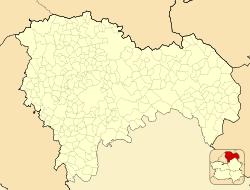This article needs additional citations for verification .(April 2024) |
Castellar de la Muela | |
|---|---|
 | |
| Coordinates: 40°49′08″N1°45′34″W / 40.81889°N 1.75944°W | |
| Country | |
| Autonomous community | Castile-La Mancha |
| Province | Guadalajara |
| Comarca | Señorío de Molina - Alto Tajo |
| Government | |
| • Mayor | Manuel Mingote Torres |
| Area | |
• Total | 21.38 km2 (8.25 sq mi) |
| Population (2024-01-01) [1] | |
• Total | 19 |
| • Density | 0.89/km2 (2.3/sq mi) |
| Time zone | UTC+1 (CET) |
| • Summer (DST) | UTC+2 (CEST) |
Castellar de la Muela is a municipality located in the province of Guadalajara, Castile-La Mancha, Spain.


